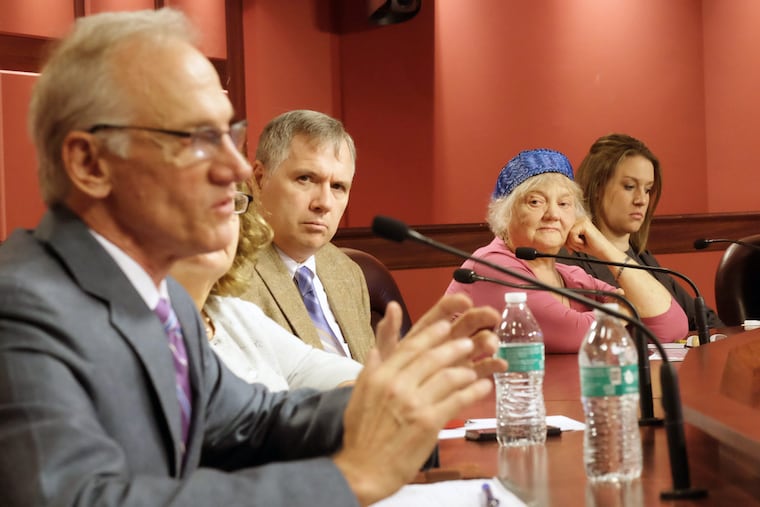Supporters, critics begin the battle over Pa. sex abuse bill
HARRISBURG - Rep. Mark Rozzi turned to Phil Saviano, sitting next to him inside the Capitol. Like Rozzi, Saviano was raped by a priest decades ago, and has worked to expose such abuse.

HARRISBURG - Rep. Mark Rozzi turned to Phil Saviano, sitting next to him inside the Capitol. Like Rozzi, Saviano was raped by a priest decades ago, and has worked to expose such abuse.
But the Boston-area man's efforts had huge impact: They helped spark the global clergy-sex abuse scandal in 2002, and figured in this year's Oscar-winning film Spotlight.
Saviano was the marquee draw on a panel assembled Wednesday by Rozzi to support a high-stakes bill that would open a new window for adult victims to sue the men or women who abused them as children and the institutions that could have discovered or stopped it, but did not.
"You are keeping victims alive here in Pennsylvania," Rozzi told Saviano, "because they know they have opportunity here with this reform legislation."
Saviano's appearance capped an intensive two-day lobbying effort by victims' advocates to win over key senators on the bill, at the same time opponents - including the Catholic Church - are marshalling efforts to defeat it.
The Senate took no action before it adjourned for the month Wednesday. Sen. Stewart Greenleaf, Republican chairman of the Judiciary Committee, has said he will bring the legislation before the full Senate when it reconvenes in June.
Greenleaf; his vice chairman, John Rafferty Jr., and minority committee Chairman Daylin Leach - all from Montgomery County - have declined to publicly take a position on the contested measure. Rafferty is the Republican nominee for attorney general.
Victims' advocates want the Senate to embrace a bill that overwhelmingly passed the House in April, in a historic turnabout for the deeply conservative chamber. Both houses are Republican-controlled.
The legislation would extend the state's civil statute of limitations to victims age 50 or under - it now applies only to plaintiffs 30 and under - and be retroactive. The result could be a flood of lawsuits by middle-aged accusers.
Key opponents include the insurance industry, questioning the constitutionality of such a law, and the Catholic Church, which has warned it could have a crippling impact on schools and parishes.
In a meeting this week with area priests, Philadelphia Archbishop Charles J. Chaput, who is credited with helping to defeat a similar law during his tenure in Colorado, urged clerics to share the message with worshippers.
"Parishioners will be hearing about the matter from their pastors in the course of the coming weeks," his spokesman, Ken Gavin, said Thursday.
Gavin said that message will include explanations of the impact of similar laws in other states, as well as reminders of the archdiocese's recognition of the past abuse and its efforts to address it - including spending $13 million since 2002 to support victims and their families.
"One important and overlooked fact is that the Catholic Church has accepted responsibility for past abuse," he said in an email. "It has worked very hard to support survivors and prevent abuse from taking place."
For years, opposition thwarted such a bill in Pennsylvania. But outrage over two grand jury reports and criminal charges this year by Attorney General Kathleen G. Kane in the Altoona-Johnstown Diocese proved key in the House's reversal.
Victims' advocates on Wednesday said civil lawsuits are essential to rooting out abusers and delivering justice to survivors, who sometimes take decades to disclose their childhood pain.
Saviano, 63, said the civil lawsuit he filed in Massachusetts well into adulthood ultimately provided access to church documents revealing that his abuser, a priest in Worcester, had been shuffled across the country by bishops, only to abuse others time and again.
Before he filed suit, Saviano said, church officials had claimed they knew nothing about the priest who abused him for nearly two years, starting when he was 11.
"I learned that the way to challenge it was to file a lawsuit," Saviano said. "It gets you access to the personnel file. It gets you access to the truth."
The other panel members represented a broad spectrum of support.
They included George Foster, a businessman from the Altoona-Johnstown area, credited as a whistleblower whose efforts helped the state grand jury probe; attorney and victims' advocate Marci Hamilton; Patricia Dailey Lewis, who helped prosecute a Delaware doctor considered one of the nation's most prolific child abusers; and three graduates of the Solebury School in New Hope, where a grand jury probe was launched into decades-old abuse by staffers at the Bucks County school.
"Under the current statute of limitations laws, who is being protected?" said former Solebury student Nicki Rowe, now an elementary school counselor. "Is it actually the children? It sounds like it's the adults making horrendous choices."
610-313-8117 @Panaritism